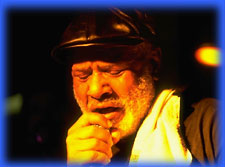

Real Blues magazine
A stomping beauty . . . Mack's harp playing is very refreshing, strong and inventive. Blues & Rhythm magazine
He didn't catch on like Little Walter or Junior Wells, but Mack could play anything. He was a great harmonica player, still is. Lonnie Brooks
He's my favorite harmonica player. Mack's cover of my song "I Wish You Would" is the best version I've heard. Billy Boy Arnold
In his remarkable 47-year career, Little Mack Simmons — Chicago vocalist and harpman extraordinaire — has performed with the some of the brightest lights of the blues world, including Robert Nighthawk, Sunnyland Slim, Eddie Boyd, Willie Mabon, Detroit Junior, Jimmy Dawkins, Lonnie Brooks, Luther Allison, Magic Sam, J.B. Lenoir and Howlin' Wolf.
Malcolm Simmons was born on January 25, 1933, in the small cotton-farming community of Twist, Arkansas. He was a childhood friend of James Cotton, who was serving as an apprentice of Sonny Boy Williamson II (Rice Miller) at the time. The two boys persisted in skipping school together for the more enticing lure of jamming on their harmonicas, and Cotton taught Simmons the harp techniques he was learning from the master.
Soon school was dropped completely, and Mack picked cotton and drove a tractor full time. Then at 18, he left for St. Louis, where he lived for two years while working on the railroad. It was here that Simmons met the renowned Robert Nighthawk and made his club debut on Nighthawk's stage.
In 1954 Little Mack moved on to Chicago, where he formed his own band and held down a five-year stand at Cadillac Baby's, as well as performing regularly at Pepper's Lounge and at Sylvio's.
In 1959 he began his recording career, initially at Carl Jones's C.J. label, then he cut tracks for Cadillac Baby and Chess Records. Over the next three years, he laid down more sides for the Palos, Bea & Baby and New Breed labels.
By the late 1960s, Simmons had redefined his musical style, incorporating an intriguing mix of gospel, country and western, funk, soul and rock influences into his blues. From the mid to late 1970s, he owned and operated the Zodiac Lounge in Chicago. He also owned a studio and recorded for his own labels: PM Records and Simmons Records. In addition he cut blues tracks for Biscayne and Dud Sound, and in the 1980s he recorded for Sky Hero Productions, in which he was a partner.
By the mid-1990s, Mack was back in the studio, cutting Come Back To Me Baby on the Wolf label in 1994 and High And Lonesome for St. George Records the following year.
But it was his 1997 Electro-Fi release, Little Mack Is Back, that proclaimed the revival of Simmons's career, reaping enthusiastic reviews from around the globe. Similarly his current Electro-Fi CD, Somewhere On Down The Line, is racking up worldwide acclaim as word is spreading that Little Mack Simmons is an artist who embodies the best of Chicago blues.
DISCOGRAPHY
SELECTED SINGLES
"Come
Back To Me Baby"
"Jumpin' At Cadillac" with James Cotton
"Times Gettin' Tougher"
"You Mistreated Me Baby"
"I Need Love"
"I Play For Keeps"
"I'm Happy Now"
"Don't Leave Me Now"
"When The Lord Stands By"
"Inflation Blues"
ALBUMS AND CDs
Little
Mack Simmons, 1975 (Black & Blue, France)
Love Will Make A Way Somehow, 1978 (Simmons Records)
Come Back To Me Baby, 1994 (Wolf)
High and Lonesome, 1995 (St. George)
Little Mack Is Back, 1997 (Electro-Fi)
Somewhere On Down The Line, 1998 (Electro-Fi)